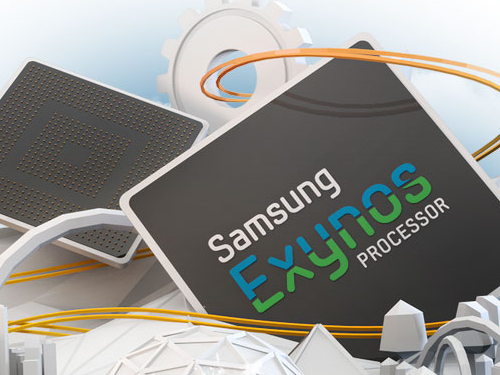Samsung Building 64-Bit Custom CPU Core
CNET reports that during a presentation at Samsung's Analyst Day in Seoul, South Korea, Samsung revealed a two-prong approach in creating a 64-bit chip: develop a 64-bit chip based on ARM's design, and then its own "optimized" 64-bit CPU core design afterwards. This approach was revealed by Stephen Woo, president of System LSI at Samsung Electronics, although a specific time frame for the custom core was not provided.
"Many people were thinking, why did we need 64-bit for mobile devices?" asked Woo. "People were asking that question until three months ago. And now I think no one is asking that question. They're asking, when can we have that?"
Previously, sources in Korea said that the next-generation 64-bit SoC would be an Exynos Octa eight-core chip using four high-performance Cortex-A57 cores and four energy-efficient Cortex-A53 cores. These cores would be able to operate independently, or in big.LITTLE processing configurations. Samsung presumably intends to release this chip with full support for big.LITTLE MP, allowing the SoC to use all eight cores simultaneously rather than the 4/4 configuration used in the current two chips.
"We are marching on schedule," said Woo. "We will offer the first 64-bit [processor] based on ARM's own core. After that, we will offer an even more optimized 64-bit [processor] based on our own optimizations."
Currently, the biggest benefit from using a 64-bit chip is the larger memory capacity, allowing devices to sport 4 GB and greater. Phones like the Samsung Galaxy Note 3 are already pushing into the PC realm with 3 GB of RAM, and it's only a matter of time before that number doubles. Apple's iPhone 5S may feature a 64-bit chip, but the company chose to remain with 1 GB of LPDDR3 memory. The A7 processor used in that phone is an ARM-based design, but optimized and tweaked by Apple.
The Tech Report adds to CNET's report, stating that Samsung revealed interesting information on Through-Silicon Via (TSV) technology, which allows memory and logic circuitry to be stacked on the same package. Samsung claims it has a real chip that uses TSV and is running all the software -- a chip that offers 14 percent better memory performance than LPDDR3 with 60 percent lower power consumption. The next generation will supposedly boost the performance advantage to 30 percent.
Samsung will reportedly begin producing SoCs using its 14 nm FinFET process starting next year. The company also plans to bring its 3D V-NAND flash memory to client SSDs next year. This vertically stacked NAND is already shipping in Enterprise-class drives and should hit mobile devices by 2015.
Get Tom's Hardware's best news and in-depth reviews, straight to your inbox.

Kevin Parrish has over a decade of experience as a writer, editor, and product tester. His work focused on computer hardware, networking equipment, smartphones, tablets, gaming consoles, and other internet-connected devices. His work has appeared in Tom's Hardware, Tom's Guide, Maximum PC, Digital Trends, Android Authority, How-To Geek, Lifewire, and others.
-
MKBL I don't like Samsung as corporation for its sly marketing tactics and doubtful ethics, but still buys its product for reliability and technological edge. I don't like Verizon for the same reason, but still carry Verizon. Why not covert to others? Well, I can't find good alternatives to meet all the criteria.Reply -
Darkk 640K of RAM is all you'll ever need. LOL.Reply
Yeah it's good to see progress of these processors to keep up with the times. 4gigs+ of RAM is going to be nice. -
milktea Samsung has their own FAB, builds their own memory, builds their own CPU. So Samsung is the next Intel? At least in the mobile space?Reply -
antilycus Poor memory management is the ONLY reason someone needs over 4gb of ram. Sure you get a speed increase because the scheduler can grab twice as much data form memory at once, but come on...these devices aren't really using that much power. Minus GPU stuff, this stuff is all pentium1 type processing. There is no way the threads are so complicated and inter weaved that 64 bit and multicore are needed AT ALL.Reply -
jasonpwns Ram1009 that is such a well written and insightful response. Aside from you know not actually providing any content.Reply -
Hunt4Epic How about some faster storage first? Lower timings ram? These would actually effect most people's day to day use more then adding 64 bit. Not to say 64 bit won't be usefully in the future.Reply -
Hunt4Epic How about some faster storage first? Lower timings ram? These would actually effect most people's day to day use more then adding 64 bit. Not to say 64 bit won't be usefully in the future.Reply
